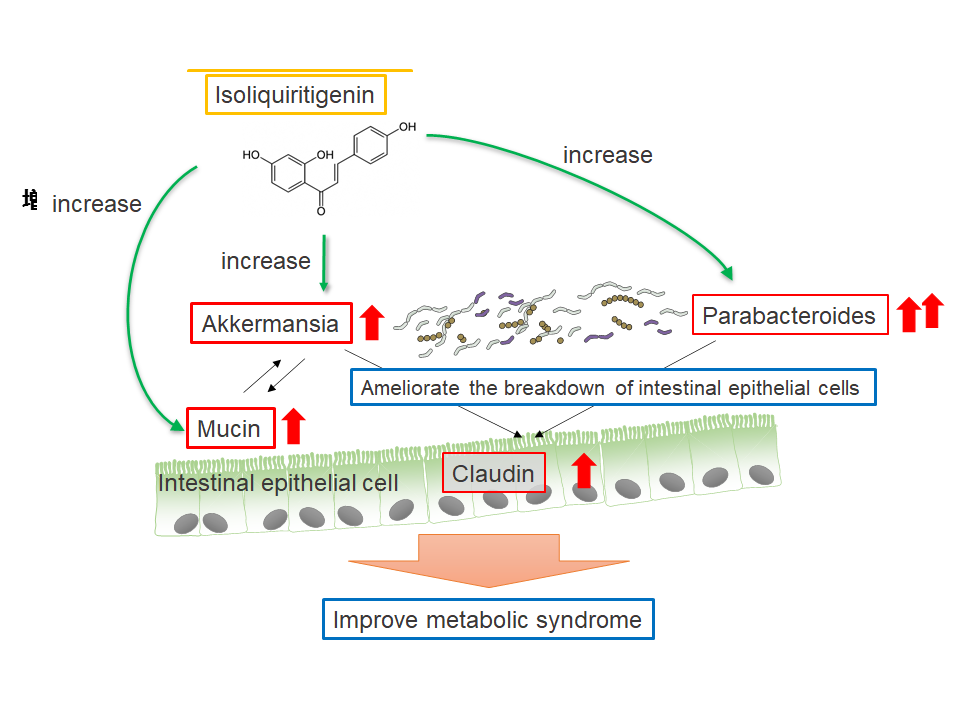Improving metabolic syndrome with a component of a herbal drug containing licorice extract

Professor
Link: https://www.pu-toyama.ac.jp/PH/nagai/index.html
【Research Theme】
Prevent lifestyle-related diseases by controlling immune metabolism (the preventive effect of isoliquiritigenin and related substances on diabetes)
【Research Highlights】
・We revealed the mechanism of how isoliquiritigenin, a component of a herbal drug containing licorice extract in Kampo, works.
・Isoliquiritigenin is a type of flavonoid contained in a herbal drug containing licorice extract.
・Isoliquiritigenin supplementation increases the abundance of beneficial bacteria, thus, enhancing gut barrier function and treating metabolic syndrome.
・Isoliquiritigenin improves obesity, adipose tissue inflammation and insulin resistance.
・The effects above of isoliquiritigenin were demonstrated with experiments on mice.
【Background and History】
The increasing number of cases of metabolic syndrome, such as obesity and diabetes, because of westernized diets, etc. is recognized as a major social issue in Japan. Many previous studies have found that chronic inflammation of visceral adipose tissue is involved in the incidence of metabolic syndrome. Those studies have also shown that the loss of diversity of gut microbiota that live in the gut is associated with the onset of metabolic syndrome. Moreover, it has been reported that some gut bacteria are beneficial while others are not in combating metabolic syndrome. Considering these reports, interest in developing new methods for preventing and treating metabolic syndrome by modifying the composition of gut bacteria has grown.
Our research group previously reported that isoliquiritigenin, a component of a herbal drug containing licorice extract, improves metabolic syndrome by attenuating inflammation and fibrogenesis of visceral adipose tissue. However, the underlying mechanisms of how isoliquiritigenin modifies the composition of gut microbiota remain to be elucidated.
【Research Contents】
Our research group fully investigated how isoliquiritigenin changes the composition of gut bacteria when mice were fed it with a high-fat diet (HFD). In HFD-fed mice, the abundance of Firmicutes taxa, bacteria known to lead to obesity, increased and Bacteroidetes taxa, known to reduce obesity, decreased. On the contrary, with mice fed HFD with isoliquiritigenin, the abundance of Firmicutes taxa decreased and Bacteroidetes taxa increased. Moreover, detailed studies of next generation sequencers indicated that taking isoliquiritigenin significantly increased the abundance of the gut bacteria Akkermansia and Parabacteroides, which improve metabolic syndrome.
With HFD-fed mice, the junction of epithetical cells in the large intestine, or the barrier function of the large intestine, were destroyed, and gut microbial products spread all over the body through the network of blood vessels, which induced chronic inflammation throughout the body. It is considered that chronic inflammation prevents insulin from working and is the cause of insulin resistance. We discovered that isoliquiritigenin supplementation in mice significantly increased the abundance of the beneficial bacteria mentioned above, which led epithetic cells to promote mucin production and up-regulate Claudin, the protein that makes the junction of epithetic cells tight, and intestinal barrier function was improved. In regard to this effect, it is suggested that isoliquiritigenin improves adipose tissue inflammation and insulin resistance (Figure 1).
In addition to this study, the feces from mice fed with isoliquiritigenin were transplanted to HFC-fed mice. This improved obesity, adipose tissue inflammation and insulin resistance of the recipient mice. This shows that the fecal gut bacteria from mice fed with isoliquiritigenin are the key player for these effects, such as anti-obesity.

Our research was conducted with the support of Toyama Pharmaceutical Valley Development Consortium.
【Future Developments】
Our research revealed that isoliquiritigenin, a content of a herbal drug containing licorice extract, has an anti-metabolic effect by increasing beneficial gut bacteria. Further studies on the underlying mechanisms of how isoliquiritigenin modifies gut bacteria composition in detail will help develop new medicines against metabolic syndrome and foods with functional claims.
Inquiries
Please get in touch with us